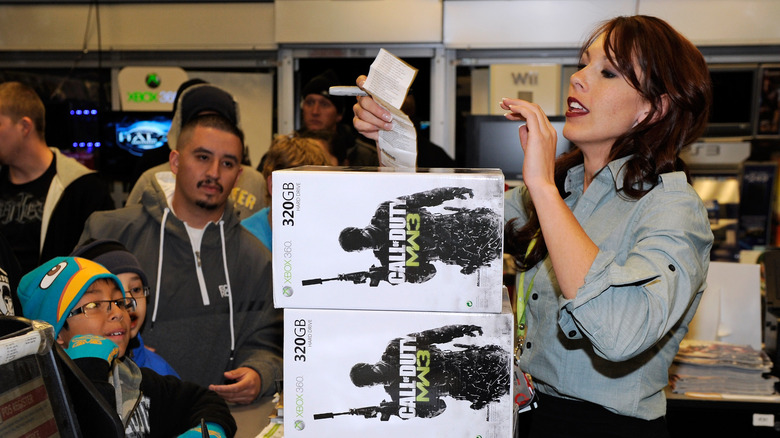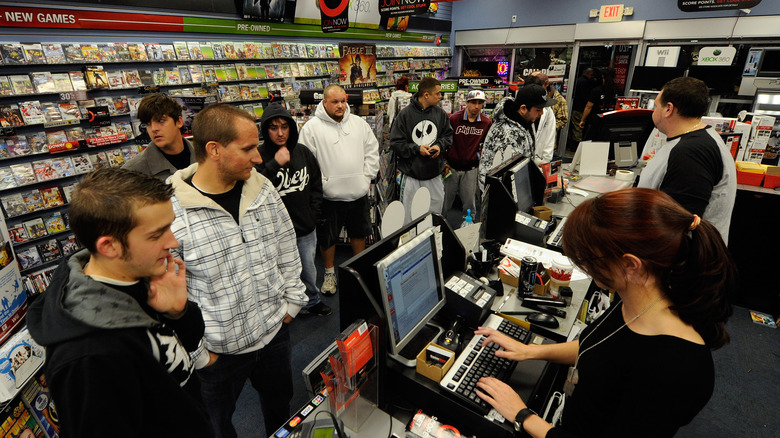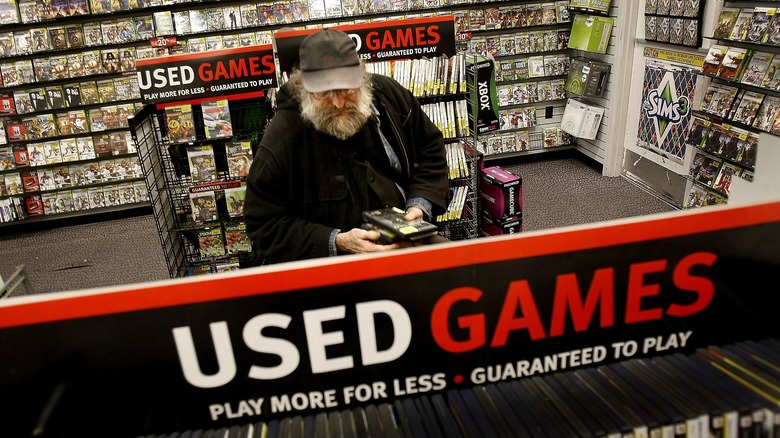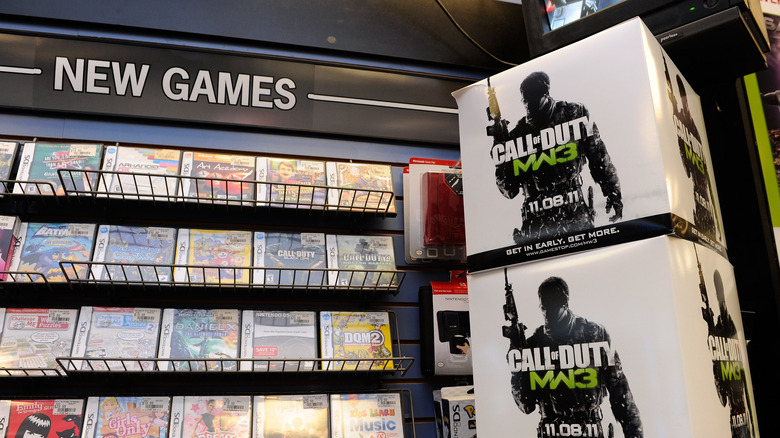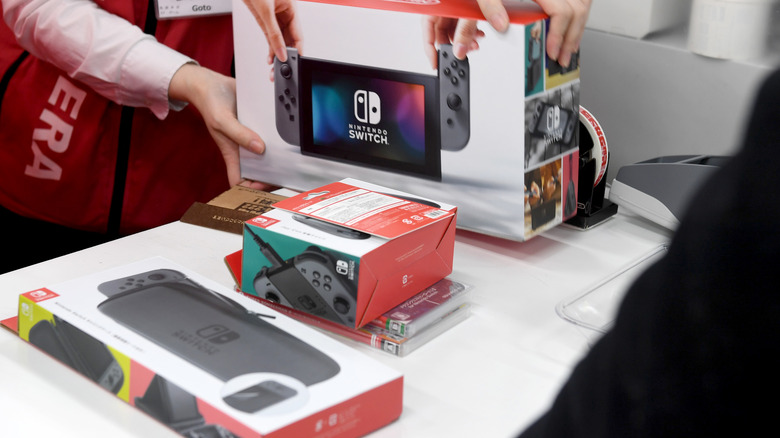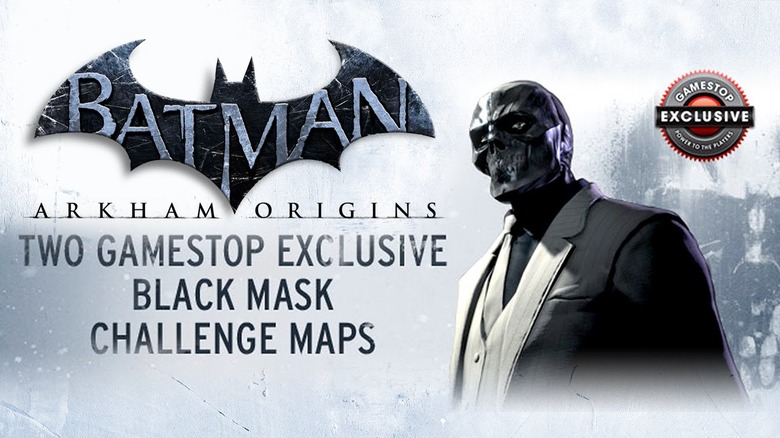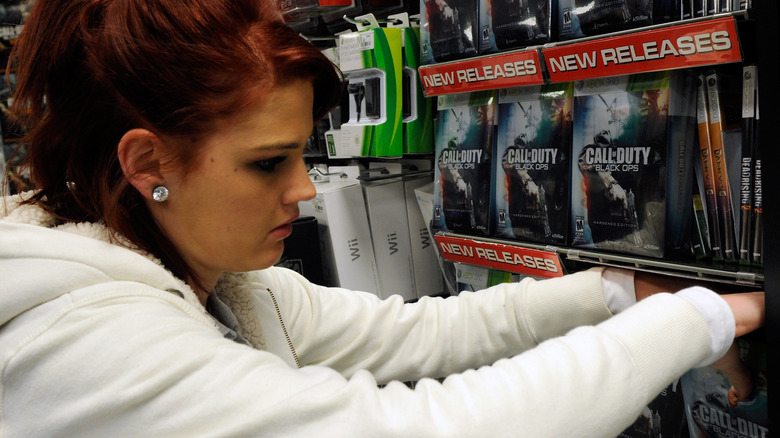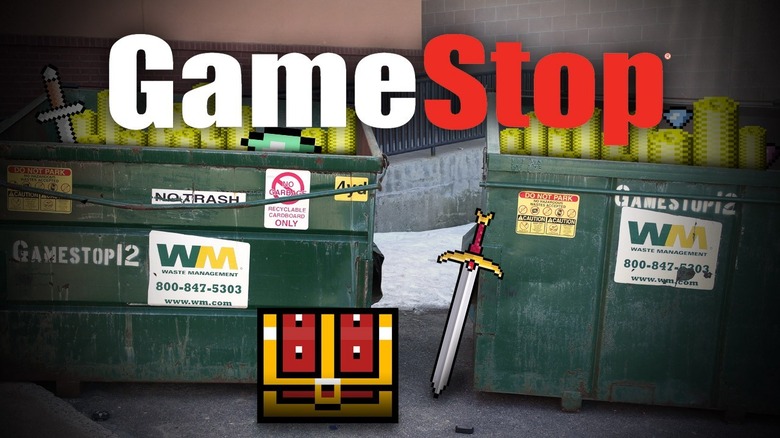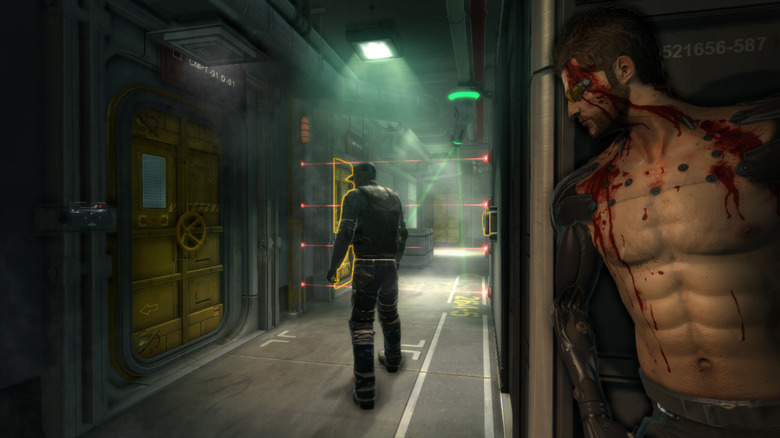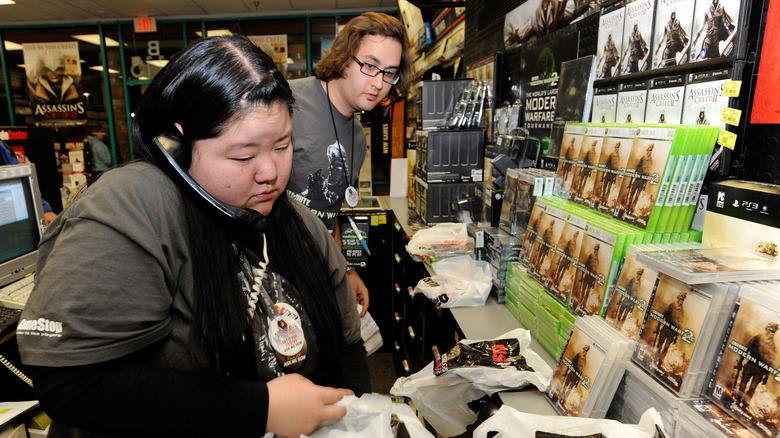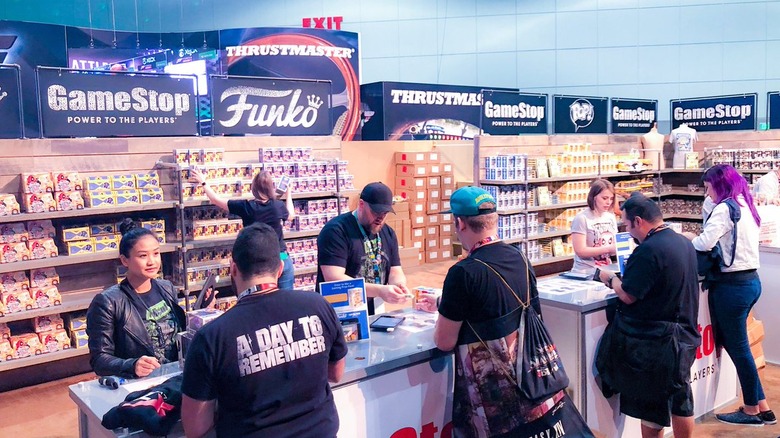The Shady Side Of GameStop
When you hear the word GameStop, what comes to mind first? Do you see your friendly neighborhood game store and the place you go for new titles? Or do you see an entrance to a nightmare underneath that signature black and red sign? Most gamers seem to be divided on how they feel about the retailer, with some gamers liking the store, and some absolutely loathing every minute they spend in it.
While opinion on the store ebbs and flows, GameStop the company has purportedly engaged in some pretty shady acts over its long history. From deceiving its customers to inflating its prices, GameStop's alleged sins against the gaming community pretty much run the gambit and have earned it a fair amount of scorn. We've put together a list of the ways GameStop has reportedly wronged gamers — and even those who work for the company — since it first came on the scene.
Once you're through, you might have to ask yourself this question: is GameStop still a place you want to shop?
Trade-ins allegedly aren't tested to make sure they work
Buying a used game from a private seller can be a gamble. You essentially have to take the seller at their word that the game works (unless they're nice enough to let you try it), and you don't have a whole lot of recourse if you get home and your game fails to load up. For reasons like this, some gamers prefer to buy used from game stores, where one would expect there to be a process that keeps damaged games off the shelves.
According to Paul Tassi of Forbes, that's not the case at GameStop. "GameStop does not test the games they buy back to make sure they actually work," Tassi wrote in 2011.
It seems kind of incredible that a game store famous for buying and selling used games wouldn't have a mechanism in place to test those games, but, that's the reality; at least, that's how Forbes tells it. Based on Tassi's account, GameStop could sell you several duds in a row, forcing you to return to the store each time to get a different copy. The next time you purchase a used game at GameStop, keep this in mind.
There's a huge gap in what GameStop offers for used games vs. what they're sold for
The average MSRP (manufacturer's suggested retail price) of a video game is $60. That's a hefty chunk of change, even though there's some debate around whether games should actually cost more or not. Still, dropping $60 is nothing to sneeze at, and some enjoy buying physical copies of games in particular so they can sell them later and recoup some of the cost.
According to John Gaudiosi of Forbes, GameStop is notorious for offering gamers very little for their trades. "What was once $60 of your hard-earned money immediately drops to $18 to $25 for a GameStop trade-in," wrote Gaudiosi in 2012, noting that GameStop also has a history of dropping the trade-in value for games that don't review well after release.
GameStop allegedly profits heavily from trade-ins to the point that a former employee believes it "would be illegal if it involved something the government regulated." The same game you trade in for $25 or $30 will be sold by GameStop for $50 or $55 — a pretty substantial profit margin.
Employees supposedly open and play games, then sell them as new
Buying a brand new, shrink-wrapped copy of a video game is the fastest way to ensure you get a physical game that works. There's an unspoken guarantee that comes with buying something that no one's opened yet. In the case of video games, you can usually rest assured the game disc was pressed, put into a case by some kind of robot, and wrapped in plastic without a human touching it. Supposedly, GameStop decided to go a different route.
GameStop employees need to know about video games so they can help customers. That's understandable. What's not understandable is why GameStop thought it was okay to lend employees copies of new games, and then sell those opened copies as new later on. Taking that shrink wrap off of the case is akin to taking a collector's item out of the box. Yes, it still has value, but that value is diminished simply because the product has been opened.
According to Kotaku, this is exactly the process GameStop allegedly had in place back in 2009. Selling an opened product as new appears deceptive at best, and as it turns out, the practice seemed to be in conflict with FTC rules. It's unclear whether GameStop still sells games this way, or if the FTC ever looked into the company's sales of used games as new. Your best bet is to ask your individual store for a shrink-wrapped copy if you absolutely, positively, must shop at GameStop.
High-demand hardware is often bundled into more expensive packages
When video game hardware is in high demand, it's almost a given that scalpers will seize on the opportunity. One only has to look back at the release of the NES Classic in 2016 to see there's a problem with secondary markets popping up to resell scarce products at a premium. That particular item could regularly be found on sites like Craigslist for hundreds of dollars over MSRP, and the increased third-party prices meant that regular folks had to pay more to buy it.
You'd expect that kind of behavior from a scalper. You would not, however, expect a well-known video game store to take advantage of its customers. According to Poey Gordon of Talk Amongst Yourselves, GameStop has a habit of bundling highly sought-after hardware products with a bunch of games and accessories that people don't want.
The company apparently applied this practice to its sale of the Nintendo Switch. The console was hard to find at its launch in early 2017, and when GameStop had consoles in stock, they were more often than sold in larger, more expensive bundles (as high as $600) instead of by themselves (at the $300 retail price).
GameStop frequently secures exclusive pre-order content for its stores only
Many gamers don't like console-exclusive content in video games. Game writers often lament its existence. Phil Spencer, the head of Xbox at Microsoft, doesn't like it. Heck, some game developers are even touting the fact that a game doesn't have console-exclusive content as a selling point. It seems the tide is turning on this type of DLC, which makes this next GameStop practice pretty mind-boggling.
Store-exclusive content. Just saying it sounds ridiculous, but it's a thing that exists. If you pre-order your game from this one particular store, you get access to special content. Those who buy the game elsewhere? They don't.
One of GameStop's more famous content deals involved Destiny, granting players who pre-ordered Call of Duty: Advanced Warfare from the store an exclusive Destiny shader. That's right — not only did players have to pre-order specifically from GameStop, but to get the exclusive content, they had to pre-order an entirely different game.
And then there's Batman: Arkham Origins. GameStop secured the rights to two exclusive Black Mask challenge maps for the games, and those who pre-ordered Arkham Origins from GameStop were able to play on them. Those who didn't were out of luck, though the Black Mask Challenge Pack later released through other storefronts as a DLC.
GameStop supposedly sells some in-demand titles as "used" to charge more than MSRP
Hardware isn't the only type of product that gets scarce. In some cases, physical game copies can sell out, and if gamers aren't hot on buying the digital versions of those games, it can be tough to track down a copy at retail. Supposedly, GameStop is ready to take advantage of those buyers, too.
The best example of this is Xenoblade Chronicles, a Nintendo Wii U game that first released in North America in 2012. The game was already rare in that not many copies of the it were printed, and it was only ever sold in two places: Nintendo's website and GameStop. Now here's where things get seedy: a source told Kotaku GameStop allegedly had the ability to print new copies, and those copies were sent to GameStop stores without shrink wrap. They were then sold — as "pre-owned" — for $89.99.
The games were supposedly never played. Had they been shrink-wrapped, they might never have been opened. But — at least the way Kotaku's Jason Schreier tells it — GameStop took advantage of the demand around the game to jack up prices, and consumers got the short end of the stick as a result.
GameStop allegedly throws away video game history on a regular basis
Believe it or not, that GameStop in your neighborhood might not have always been a GameStop. It could have been a Babbage's, or an Electronics Boutique (EB), or a Funcoland. The truth is, the roots of GameStop go back years and years to the first Babbage's store in 1984, and the company has had its hand in video games — and video game history as a result — ever since.
Unfortunately, GameStop may not be the best steward of that history.
According to 8 Bit Central, GameStop has a habit of throwing out all sorts of products and paraphernalia that it has no use for in its stores. Some of these items, like promotional stand-ups and kiosks, are saved. But others, such as game cases, manuals, and even whole games themselves, supposedly get tossed in the dumpster when GameStop has determined that they're taking up space.
This could be especially dangerous now that GameStop has, again, decided to take part in the business of selling retro games. Based on 8 Bit Central's assertions, there's no guarantee games sold to GameStop won't be trashed in the future, which does not bode well for video game preservation efforts.
Stores once removed free On-Live codes bundled with Deus Ex: Human Revolution
When Deus Ex: Human Revolution launched in the summer of 2011, retail copies of the PC version not only included the game disc, but a free OnLive code for the game, too. OnLive was a game streaming service that operated much like Google Stadia. Players didn't need a dedicated game hardware to play OnLive titles, but instead, could stream to any device capable of running OnLive's software.
According to Kotaku, GameStop didn't like the idea that buyers of Human Revolution might find a code for OnLive — especially when GameStop operated a game streaming competitor in Impulse. So, the company instructed stores to remove the OnLive code from the box while still selling the game as "new" at its full retail price. When caught, GameStop didn't apologize — instead, it defended the act, saying "We don't make a habit of promoting competitive services without a formal partnership."
It survives by pushing a controversial "Circle of Life" sales process
Have you ever wondered why you can't purchase a product at GameStop without being pressed to pre-order the next Madden, sign up for Pro Rewards, or buy game insurance? Believe it or not, the store associate isn't asking just to make your experience unpleasant. They're actually doing what it takes to keep their jobs, thanks to a highly aggressive strategy GameStop supposedly calls the "Circle of Life."
It sounds so nice, doesn't it? Just saying "Circle of Life" can conjure up memories of The Lion King. You're probably singing the song in your head right now. But GameStop's Circle has less to do with nature and more to do with how it can wring the most money out of its customers. Because GameStop isn't just happy getting you into the store to buy a game. It wants you to stick around throughout the entire process, and that includes getting you to come back for your pre-orders, getting you to pay regularly with a Pro subscription, and enticing you to sell back what you've purchased later.
According to Kotaku's Jason Schreier, employees and locations are judged by how well they "upsell" you on more stuff at the cash register. There's a quota system at play, and failing to meet standards can mean employees get less hours, or worse, they lose their jobs. As a result, they feel compelled to offer you things you probably don't want.
The next time you're in a GameStop store, just know that it's not entirely the checkout guy's fault.
GameStop deemed itself an essential business during the coronavirus pandemic
"Quarantine" has become an all too common word in 2020 thanks to the coronavirus. As citizens are being asked to isolate themselves from others, many businesses are being forced to temporarily shut down for the safety of both employees and customers.
GameStop, however — in a classic GameStop move that only GameStop would attempt to pull off — tried to skirt by these restrictions. And how did the company do that, you ask? By claiming it was just as essential to the lives of human beings as, say, grocery stores or pharmacies.
"Due to the products we carry that enable and enhance our customers' experience in working from home," the retailer wrote to employees, "we believe GameStop is classified as essential retail and therefore is able to remain open during this time."
Needless to say, a lot of people weren't buying it. The backlash from GameStop's decision came quickly, with many employees and customers criticizing the company's apparent desperation during a very serious crisis. After a few days of being absolutely pummeled by both everyday citizens and the press, GameStop backed down and closed many of its storefronts, though some continue to operate via curbside pickup. The company also said it would continue paying its employees for an additional two weeks.

